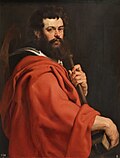Priscillianism was a Christian sect developed in the Roman province of Hispania in the 4th century by Priscillian. It is derived from the Gnostic doctrines...
11 KB (1,509 words) - 17:48, 1 July 2024
Priscillian (in Latin: Priscillianus; Gallaecia, c. 340 - Augusta Treverorum, Gallia Belgica, c. 385) was a wealthy nobleman of Roman Hispania who promoted...
19 KB (2,369 words) - 20:07, 25 June 2024
Johannine Comma (section Priscillian of Avila)
Metzger and others. Priscillian was probably a Sabellianist or Modalist Monarchian. Some interpreters have theorized that Priscillian created the Comma...
146 KB (18,591 words) - 01:52, 10 July 2024
leader, Priscillian. The First Council of Saragossa had forbidden several of Priscillian's practices (albeit without mentioning Priscillian by name)...
58 KB (7,581 words) - 18:42, 5 July 2024
Vol. 8. New York: Robert Appleton Company. Chadwick, Henry (1976). Priscillian of Avila. Oxford University Press. ISBN 978-0-19-826643-3. Cervantes...
25 KB (2,417 words) - 23:31, 24 June 2024
Although the Suebi and Visigoths were initially followers of Arianism and Priscillianism, they adopted Catholicism from the local inhabitants. St. Martin of...
228 KB (19,800 words) - 03:44, 14 July 2024
of heresy by the Emperor, the first Christian heretic to be executed, Priscillian, was condemned in 386 by Roman secular officials for sorcery, and put...
41 KB (4,600 words) - 05:51, 1 March 2024
Collyridianism Dualism Ebionites Euchites Gnosticism Manichaeism Paulicianism Priscillianism Naassenes Ophites Sethianism Valentinianism Iconoclasm Luciferianism...
172 KB (20,754 words) - 03:00, 13 July 2024
execution of Priscillian and his followers may be cited as typical of the treatment of heretics conditions in that time. In 384, Priscillian was condemned...
20 KB (2,555 words) - 20:03, 3 May 2024
"Stone" or lapis itself is informed by early Christian allegory, such as Priscillian (4th century), who stated, Unicornis est Deus, nobis petra Christus,...
28 KB (3,274 words) - 13:39, 11 June 2024






